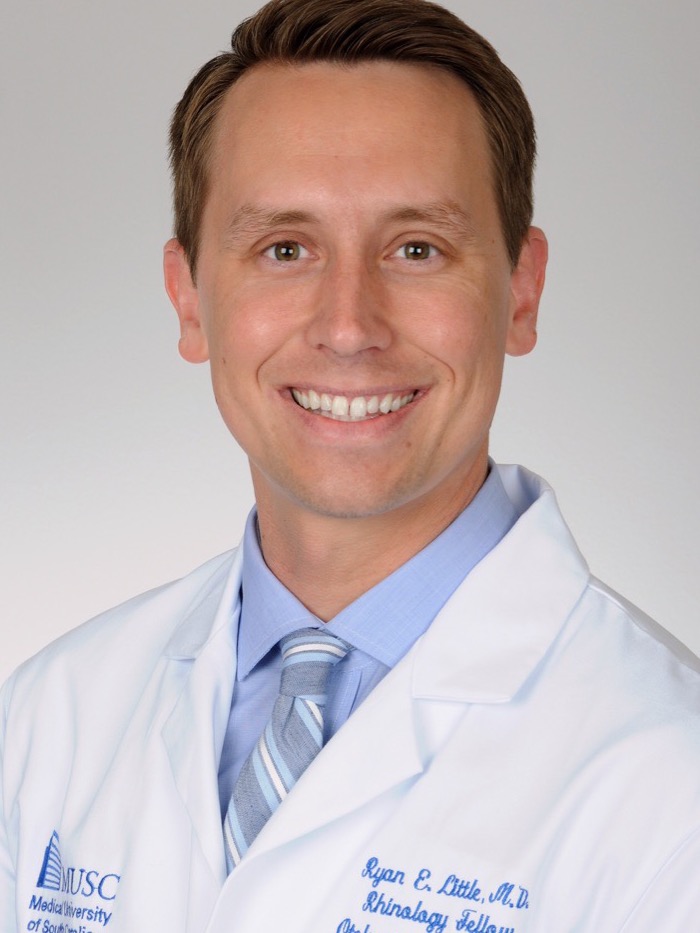Ryan E Little, MD
Title(s)
Assistant Professor of Surgery
Additional Titles/Positions/Affiliations

Rhinology, Endoscopic Sinus & Skull Base Surgery
Division of Otolaryngology - Head and Neck Surgery
Department(s)
Surgery
Education
Fellowship
Rhinology, Endoscopic Sinus & Skull Base Surgery
Medical University of South Carolina, Charleston, South Carolina
Residency
Otolaryngology - Head and Neck Surgery
Medical College of Wisconsin Affiliated Hospitals, Milwaukee, Wisconsin
Doctor of Medicine (M.D.)
University of North Carolina at Chapel Hill, Chapel Hill, North Carolina
Board Certification
American Board of Otolaryngology – Head and Neck Surgery
Academic Analytics
View Profile
Contact Information
One Medical Center Drive
Lebanon NH 03756
Office: 6036508123
Email: Ryan.E.Little@Dartmouth.edu
Professional Interests

Sinus Center Services
Functional Endoscopic Sinus Surgery
The goal of functional endoscopic sinus surgery is to restore the natural physiologic drainage to the sinuses and allow for topical medications to treat the sinuses.
Septoplasty
Endoscopic septoplasty can relieve symptoms of nasal obstruction caused by a severe septal deviation.
Cerebrospinal Fluid (CSF) Leak Repair
Spinal fluid leaks into the nose may occur spontaneously or as a result of craniofacial trauma. They can typically be repaired endoscopically through the nose in order to prevent the development of meningitis.
Endoscopic Pituitary Surgery
Transsphenoidal endoscopic surgery is the most common surgery used to remove pituitary tumors. Call to learn more.
Endoscopic Orbital Decompression
Endoscopic orbital decompression is a surgical treatment for thyroid eye disease, also known as Graves' ophthalmopathy, secondary to hyperthyroidism.
Endoscopic Dacryocystorhinostomy (DCR)
Endoscopic DCR is a treatment for watery eyes (epiphora) caused by lacrimal system obstruction that does not require any external incisions.
Smell & Taste Disorders
In-office olfactory testing can assess your ability to sense common odors. A nationally recognized and standardized scratch and sniff test evaluates your sense of smell identification for 40 common odors. This testing may be helpful in determining the presence and severity of your loss of smell, based on normative data from individuals with your age with a normal smelling ability.
In-Office Treatments
- Chemical Cautery or Electrosurgery for Recurrent/Severe Nosebleeds
- Cryotherapy or Radiofrequency Ablation for Treatment of Chronic Nasal Drainage and Vasomotor Rhinitis
- In-Office Polypectomy for Nasal Polyps
- Inferior Turbinate Reduction for Treatment of Nasal Obstruction
Culture Directed Antibiotic Therapy
Culture directed therapy may be used to treat sinusitis to avoid issues with antibiotic resistance and to guide an individual patient's treatment.
Vasomotor Rhinitis Surgery
For patients with chronic non-allergic rhinitis (runny nose) and vasomotor rhinitis that respond to topical medications, this outpatient, surgical treatment may be an option.
Monoclonal Antibody for Polyps
This novel FDA approved, non-steroidal medical therapy may be an option for patients with nasal polyps in order to reduce nasal polyps and avoid the need for surgery.
Stereotactic computer-assisted (navigational) surgery
Computer assisted surgical navigation is a relatively new tool used in select cases. These devices provide information on the anatomic location of instruments within the sinuses during surgery and can also be used to perform 3D reconstructions that may be helpful to your surgeon. It is typically indicated for revision cases, nasal polyposis, or skull base tumors where normal surgical landmarks have been removed or altered. As with all equipment, image-guided systems can be wrong from time to time and surgeons cannot rely solely on the technology. They must correlate the image-guided information with their training, experience, and knowledge of the anatomy in order to avoid complications due to human or technical errors.
Sinus Research Center
Clinical Trials
- Impact of Highly Effective Modulator Therapy on Sinonasal Microbial Communities, Host Mucosal Inflammatory Environment and Quality of Life in Adults With Cystic Fibrosis
- ENLIGHTEN 2: A Phase III, Randomized, Blinded, Controlled, Parallel-Group Trial to Evaluate the Efficacy and Safety of LYR-210 for the Treatment of Chronic Rhinosinusitis (CRS) in Adults (LYR-210-2021-005)
- A randomised, double-blind, parallel group Phase III study to assess the efficacy and safety of 100 mg SC depemokimab in patients with chronic rhinosinusitis with nasal polyps (CRSwNP) ANCHOR-1 (depemokimAb iN CHrOnic Rhinosinusitis)
- Effects of hyperbaric oxygen therapy on the sinonasal microbiome
Mentoring Information
Biography
Dr. Ryan Little is a board-certified, fellowship trained rhinologist at the Geisel School of Medicine at Dartmouth with experience in the diagnosis, treatment, and management of problems involving the nose and sinuses. He completed further fellowship training in advanced rhinology, neurorhinology and endoscopic skull base surgery at the Medical University of South Carolina in Charleston, South Carolina. Dr. Little attended medical school at the University of North Carolina School of Medicine in Chapel Hill, North Carolina and completed his residency training in Otolaryngology – Head & Neck Surgery at the Medical College of Wisconsin and Children’s Hospital of Wisconsin.
Dr. Little is an active member in the American Academy of Otolaryngology – Head & Neck Surgery and the American Rhinologic Society. His research interests include success rates and proper application of endoscopic sinus surgery for chronic rhinosinusitis, control of symptoms and disease burden in chronic rhinosinusitis, evaluating risks of systemic corticosteroids specifically aseptic necrosis and hip fractures, pathophysiology of olfactory loss in chronic rhinosinusitis, and the surgical management of anterior skull base pathology and cerebrospinal fluid leaks. He was the recipient of the North Carolina Board of Governors Medical Scholarship, and is an active member of the Alpha Omega Alpha (AOA) Honor Medical Society. He has written several articles for peer-reviewed medical journals and textbooks, presented numerous research studies at national conferences, and served on multiple national committees for patient advocacy as well as allergy, asthma and immunology. Dr. Little is committed to providing the best and safest care for his patients.
Clinical Expertise
Dr. Little is the only fellowship trained academic rhinologist/sinus surgeon in New Hampshire, and our practice is devoted solely to patients with problems of the sinuses, nose and skull base. We utilize the latest technologies and routinely collaborate with other subspecialists from Dartmouth-Hitchcock Health to deliver the best and safest care possible.
• All aspects of medical & surgical treatment of inflammatory sinusitis & revision sinus surgery
• Odontogenic sinusitis
• Anterior & central skull base neoplasms
• Pituitary tumors & stellar/suprasellar masses
• Endoscopic repair of cerebrospinal fluid leaks & encephaloceles
• Nasal congestion & obstruction
• Orbital & optic nerve pathology (e.g. Graves' Thyroid Eye Disease)
• Otolaryngic allergy
• Smell & taste disorders
Surgical management of rhinosinusitis for the allergist-immunologist. Oral corticosteroid use and the risk of developing avascular necrosis: A large retrospective review. Objective sleep measures after endoscopic sinus surgery in patients with chronic rhinosinusitis. Evaluating the Relationship Between Olfactory Function and Loneliness in Community-Dwelling Individuals: A Cross-sectional Study. Disease control after surgery for chronic rhinosinusitis: prospective, multi-institutional validation of the Sinus Control Test. Utility of Second-Look Endoscopy with Debridement After Pediatric Functional Endoscopic Sinus Surgery in Patients with Cystic Fibrosis. An Unanticipated Airway Finding After Orotracheal Intubation With a GlideScope Videolaryngoscope. Odontogenic sinusitis: A review of the current literature. Pharyngoesophageal diverticuli: diagnosis, incidence and management. Local iontophoretic administration of cytotoxic therapies to solid tumors. |
|